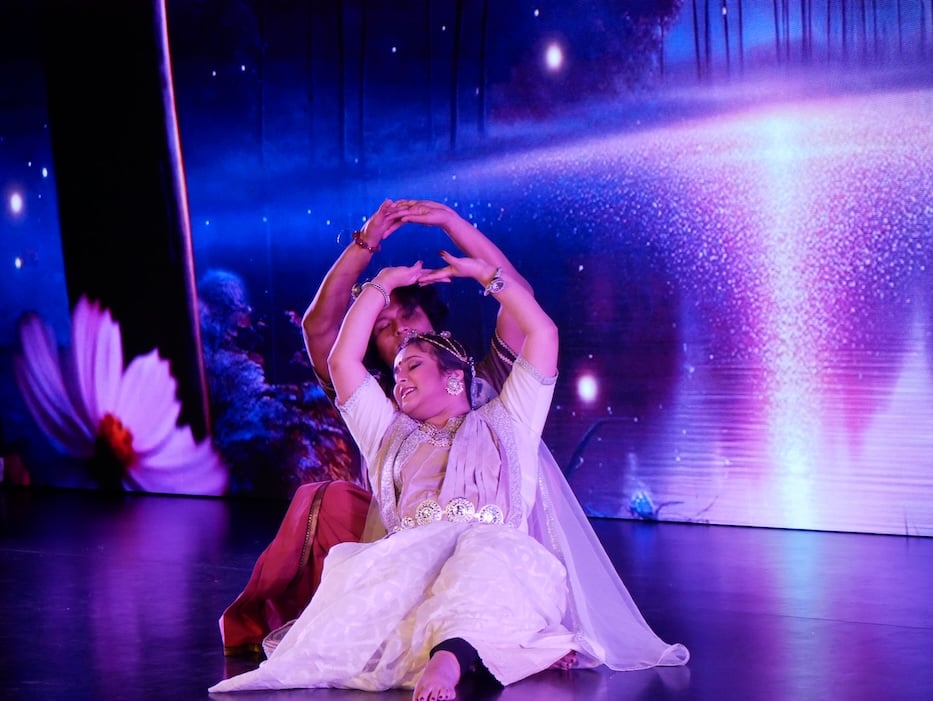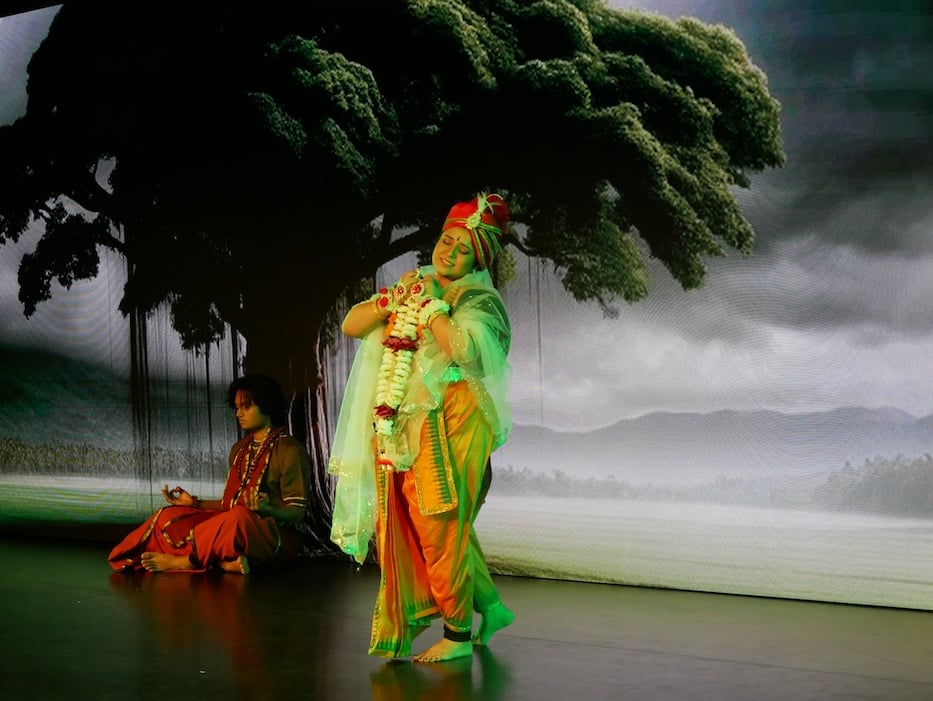
MarQuel Horton Woods Photos.
“Neither goddess, nor a common woman,” uttered Chitrāngadā, and the audience was transported. “I am not the one you hail in the altar, to worship. Nor am I someone to be left behind, in negligence.” The energy crackled around her.
That scene came to downtown New Haven on a recent weeknight, as the Yale Bengali Student Association (YBSA) brought Rabindranath Tagore’s Chitrāngadā to the Off-Broadway Theater for four performances open to the public. Performed with English subtitles, it made history as the first fully realized South Asian production of its scope to grace the university.
YBSA member Saiti Srabonti Halder, a fifth year doctoral student in biomedical engineering, described it as an effort to introduce the work of Tagore—the only Bengali to ever win a Nobel Peace Prize—to audiences at and beyond the university.
“Not a lot of people know about him,” Halder said, calling Tagore “The Shakespeare of Bengal.” “I would love for this production to get more exposure.”
The play’s significance goes back to 1936, when it was first written and published. Set in 10th century Manipur, a city in Northern India, the show follows the story of Chitrāngadā (Halder), a warrior princess raised by her father as a boy. She begins to question herself when she meets Prince Arjun (Nicholas Chowdhury), falls in love with him, and is rejected because of her masculine appearance.
She prays to the God of love to grant her charisma and beauty, but by doing so she loses herself. It’s thus a love story on two fronts; the true love that ultimately develops between Chitrangada and Arjun, as well as the love that Chitrangada ultimately finds within herself.

As members of the YBSA worked to bring the show to New Haven, they dedicated hours to making the production a reality. As main character, choreographer, and director, Halder poured herself into the production. When rehearsals began, cast members included dancers and actors still new to the stage, meaning that it became a learning opportunity for many of the people involved.
Halder’s goal for this production, meanwhile, was to make it as accessible as possible while maintaining the authenticity of the original work. Crew members included English subtitles throughout the play, so that the audience could understand the narrative unfolding onstage. Meanwhile, members of the production team used color throughout the story to add to the ambiance and give insight into the tone of the scene.
Onstage, all of that effort came vibrantly to life. During the first act of the play, actors used bright colors that grew dull as Chitrāngadā dulled her personality for the prince. Crew members used white to signify magic, red and orange to represent masculinity, boldness of character, and conflict, blue during calm scenes and self-reflection. There was green for jealousy and purple for lust.
YBSA members also brought Chitrāngadā’s story into to the present. At the end of the play, actors displayed the colors of the non-binary flag—yellow, white, purple, and black—as a statement of full self-acceptance and a more fluid gender identity. “If Chi was alive in today’s world … they wouldn’t have to put themselves in a bucket of man or woman. They didn’t have those options back then,” Halder said.
At a recent performance, excitement buzzed through the air, attendees excited to see a production that was not new to the universe, but completely new to New Haven. One audience member, Iver, said that it was “important to tell stories from all over the world,” and they delighted in seeing such diversity at Yale.
That hard work, meanwhile, has already paid off. At the end of a recent performance, cast members stressed the importance of cultural community and finding comfort in the language of one’s home country. They also want to leave a lasting impression on Yale campus and opportunities for more similar productions to be at Yale even after they all graduate.
YBSA members feel that they are one step closer to getting a Bangla language course at the university, one of the group’s long-term goals. After the short run in New Haven, Halder and YBSA members also got an invitation to take the show to New York City. “I would love to take this to a bigger place and a bigger audience,” Halder said.
Halder said she encourages everyone to “go out and support the arts … I think for performers that is the biggest thing.” She added that she wants everyone to look for the hidden gems from people, particularly those who are not as frequently represented in theater and media. To her, diversity and representation are extremely important.
Here is a link to the petition to support Bengali students and their efforts to get a Bangla class at Yale. And here is the Venmo to donate to help Halder and cast members be able to put on more productions of Chitrāngadā in the future: @Mrinmoyee-Guha